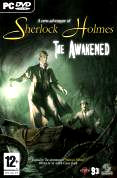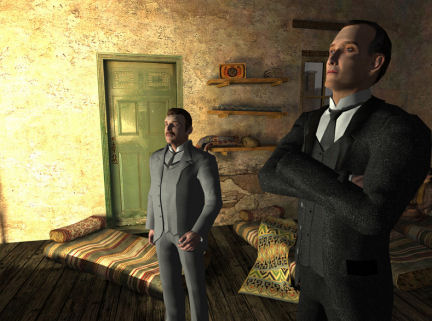|
Waël AMR
talks about Sherlock Holmes: The Awakened
The Awakened
is Frogwares’ third Sherlock Holmes game in the past four years (Frogwares
has also developed games like 80 Days, based on the Jules Verne
novel).
How will this
latest game be different from the previous Sherlock Holmes games – will it
improve upon Mystery of the Mummy’s labyrinthine Egyptian-themed
rooms, or depart from The Silver Earring’s polished wit and
elegance?
For this adventure, CEO
Waël
AMR describes a journey into the
darker, more terrifying aspects of Holmes’ investigations, as the famous
detective confronts some of the nightmarish creatures from the world of
H.P. Lovecraft.

What is your personal opinion of Sherlock Holmes? What explains the
public’s enduring fascination with Holmes and Watson?
Two years ago, I was asked this question by a German web
site. The answer I gave (like Holmes’ presence among us) is still
applicable.
Sherlock Holmes is extremely fascinating for different
reasons, but they all come from one main truth: Sherlock Holmes is a
brain. “I'm a brain, Watson, the rest of me is a mere appendix,” as he
likes to say to his friend. From this fact different elements can be
deduced.
If you take into consideration that humans are thinking
animals, the most successful of us are supposed to be the most intelligent
too. Some of us envy Sherlock's capacity for reasoning and deduction, as
some women envy the beauty of other women, or some people envy the
contents of another person’s purse.
Having Sherlock Holmes' brain, you can deduce the work, the
family situation, the vice, even the diseases of people that you meet. So
you can know the past of these people, and in extenso, their
future. Sherlock Holmes is, in a certain way, clairvoyant. He has a status
of an extraordinary person; he is close to being a magician. In spite of
having no tricks, he is above the others.
Sherlock Holmes is a brain, but he is not working in a
circus, he is working against crime in the world’s most civilized and
wealthy society of his time: England and London. He is looking for the
truth and finding it, "…however improbable" it might be. Despite looking
for the truth, he is not a part of any institution, and he chooses to tell
the truth (or not) to the authorities depending on the morality of the
affair (“The Second Stain,” “The Devil’s Root”). Sherlock Holmes becomes a
hero in these cases as he is not an employee of the Crown.
Sherlock Holmes is a brain, dedicated to solving crimes.
He is harming himself, not stopping to eat and to sleep because he hasn’t
yet found a solution. He is sick without activity, pushing himself to fill
his empty time with dangerous substitutes (“The Sign of Fours”). Sherlock
Holmes remains fragile and human, and so accessible, then lovable.
Sherlock Holmes is a brain, so he is an artist in his
profession and in his hobbies. He dramatizes the truth in a perfect way,
shedding the light only at the time he chooses and the way he chooses. He
reveals elements in a certain order to get a spectacular result and so get
admiration from others (“The Silver Blaze”). He loves music, plays the
violin. His granduncle was French and a painter from the Vernet family,
and Holmes strongly believes that artistic taste and talents are
hereditary.
Sherlock Holmes is a brain, but he is alone, he has only
one friend, Doctor Watson and a brother, Mycroft. He cannot reproduce
himself and there is no way he will have an heir. The consequence of this
is that he is becoming immortal, as well as a deity that can be
worshipped.
Then does a person who is the most intelligent, a hero,
lovable, an artist both in his work and life, and who is subject to
worship, deserve a good game based on his stories? I think yes.

What
atmosphere are you trying to evoke in The Awakened? Will the game be more
light-hearted than The Silver Earring? Or darker in tone?
The game is heavily darker than The Silver Earring.
This time Sherlock will face an evil nemesis to the border of madness.
This game is the meeting between Sherlock and H.P. Lovecraft’s writings,
as the cover of the game suggests. We thought it would be interesting to
follow the paradox between Holmes -- who believes in reality and only in
reality -- and Lovecraft -- whose writings are based on the deep and
abiding presence of the unnatural. Of course this paradox becomes part of
the Holmes–Watson reaction.
Would you
ever consider creating a game based on an Arthur Conan Doyle story – Hound
of the Baskervilles, for instance? What are the advantages of working
with an original Sherlock Holmes story?
I doubt it. Among the 56 novelettes and the four novels
there is little possibility to create a game without deep changes in the
Arthur Conan Doyle stories, and we don’t wish to adapt or modify the
Canon. On the other hand, Holmes’ character is so well known and deep that
there is enough material to create excellent stories.

Will the gamer
get to control Watson? How will gameplay change to reflect Watson’s
abilities?
Yes we control Watson, mainly as Sherlock’s helper, in
spite of the strange ways this takes in the game. But most important is
that Watson is the balance in the game, the one ready to believe in horror
and the unnatural, while Sherlock stands his ground. The player will
believe one or the other, depending on the story elements. As in reality,
the border between sanity and madness is sometimes very thin.

Are there
any challenges that are time-sensitive? Any stealth sequences? Will
there be any chapter-ending quizzes as there were in The Silver Earring?
Anything else you can tell us about the puzzles?
The game is an adventure, mouse control only, still-frame
puzzles, a few 3D puzzles, and inventory based puzzles. The game has a
few innovations concerning the magnifying glass and the way to get Hints.
It contains true puzzle innovations using physics or real-time lighting.
We are interested in the player reaction to these.
There are no real timed or stealth sequences in the game. They are now
banished from our games.

The quizzes are present, but in a different form. They
move along the story, and they also are a tribute to text adventure games.
Overall, as in The Silver Earring, you have to
follow the story, to understand it and make your own deductions. It is
essential for our Sherlock Holmes games to give deep immersion to the
player and the power to make decisions.
What is the
interface like? Is it more like the interface from The Silver Earring, or
more like that in 80 Days? Is there a mini-map? Or a handy notebook
that records conversations and keeps track of evidence?
If I have to make a comparison, I’ll make it to Tex
Murphy: Under a Killing Moon.
The game is first person, and 3D. There is no mini-map.
Some levels are of average size (but far less than 80
Days). You can teleport immediately to main places after you have
found them using the map in the inventory.
There’s a useful handbook needed to answer key questions.
It stores all dialogs, reports and documents.
I see that
Scotland is one of the locations in the game. I am picturing Holmes in a
kilt – could this happen?  I’ve also seen mention of Louisiana as
another game location. Any chance that Holmes will walk the streets of
historic New Orleans? If so, did you visit New Orleans in order to get
ideas for creating that particular environment?
I’ve also seen mention of Louisiana as
another game location. Any chance that Holmes will walk the streets of
historic New Orleans? If so, did you visit New Orleans in order to get
ideas for creating that particular environment?
A kilt is not on
the menu this time, we had enough with 80 Days and GPAK

Sherlock is going to New Orleans and the surroundings. We
planned to go there but the events there prevented us from making the
usual “live” study. However, we worked quite faithfully to the original
area. The Bayou in the game is certainly worthy of a night visit.

Screenshots of The Awakened show many views of docks and ships. There
is also a screenshot showing a close-up of part of a fish. How much of
the game will be spent on or near the water?
Sherlock Holmes has to deal with the Cthulhu myth or Dagon,
so a big part of the game takes place near the water.

I thought that the story for The Silver Earring was terrific. Is the
game script writer for The Awakened the same as for The Silver Earring?
How do you merge gaming challenges and an authentic historical environment
with the deep, twisting story that Sherlock Holmes fans have grown to
expect? For The Awakened, did you write the story first, and then come up
with the puzzles, or vice versa?
The story writer is the same, and will remain the same for
the next three Sherlock Holmes games. The story of The Awakened is
brilliant, and quite different than The Silver Earring. This time
the puzzles were implemented at the time of the writing. Some are easy and
some require true thinking from the players.
What about the
process of creating adventure games engages you the most? How do you come
up with new projects, themes and ideas?
The conception is a fantastic moment, with sketches, ideas,
endless discussions. The gathering of the game, too, when all the building
blocks are assembled, and the dozens of thousands of files which have been
created fit together like a giant puzzle.
We ask the writer to submit ideas for new games; we are too
close to the production to have enough distance to create new stories.
When will the
game be released? Any news yet of a North American publishing partner?
The game is to be released later this year. For the U.S.,
we are now discussing that the game will probably be released next year.
|